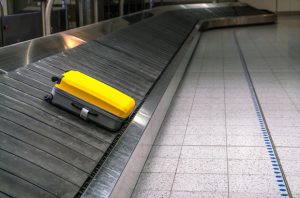According to aviation technology firm SITA, 6.53 bags out of every 1,000 checked bag globally went missing in 2015, which is a stark improvement over years past. Domestically, the odds are even more in your favor with only 3.24 bags per 1,000 lost last year. Of course, those rather slim chances offer no consolation to the traveler without any underwear the next day or those that have lost valuable items in checked bags.
There are many things you can do to prevent your bags from being lost in the first place, other than not checking one at all.
But if you do check, take note of this simple, but important piece of advice of Stefan Krasowski, a globetrotter who has visited almost every country in the world and blogs for Rapid Travel Chai. “ Inspect the luggage tag before your bag is whisked away on the conveyor belt. It is an easy for check-in agents to put someone else’s tag on your bag or use the wrong airport code..”
How about shipping bags to your destination? There are many services like Luggage Forward or Luggage Free that transport your luggage safely and quickly to your final destination. Sometimes the fees are similar to what an airline would charge, and these companies do all the heavy lifting for you. Another option: shipping by UPS or FedEx ground 5 or so days ahead of your arrival. Depending on the distance and weight of your shipment, costs can be about the same as the typical $50 round-trip checked bag fee most airlines charge domestically.
But, what if your bag is lost? Follow these important tips to help minimize any stress.
Download the airline’s app
Some airlines, such as Delta, allow you to keep track of your bags across your journey. It notifies you when the bag was offloaded one plane and placed on your connecting flight. You are able to see in real time where your bag is (or isn’t). By mid-2018, the International Air Transport Association (IATA) will require its 250+ member airlines to allow passengers to track checked bags during their journey.
Both Alaska and Delta even promise that your bag will make it to the carousel in 20 minutes or less; if not, both airlines will award you with bonus frequent flier miles.
Act fast
The earlier you get to the airport, the more time your bag has to make it to the appropriate place. Late arrivals may often find airlines unwilling to check a bag because it needs more time to make it through the system at some airports. If you arrive sans luggage, you have 24 hours to report that your bags have gone missing if you want help from the airline. International travelers have as much as a week to report, depending upon the airline, but there is no reason not to do it immediately. Be sure to have identification tags on the outside and inside of the bag to assist in recovering your bag expeditiously.
“If the airline locates your bag, they typically will deliver it to your address, saving you a trip back to the airport,” adds Krasowski. “If you are moving on to a new city and your bag won’t catch up to you, have the airline send it back to your home.”
Keep a record of what you packed by taking photos
When packing your bag, it’s wise to snap photos of what is inside and the value of those items (receipts will help). By putting everything out on the bed before packing it in a suitcase, you can get a good photo of the contents while also getting the chance to reconsider excess items you just might not need to bring. Take a photo of the bag’s exterior as this will help agents identify it; if your bag gets damaged, this is also proof of its original condition.
Another great tip is to put a business card and copy of your flight itinerary inside your luggage; that way an airline can reunite you and your bag at your current location. Add a luggage strap to keep the bag’s sides in place in case a zipper breaks or bag is punctured.
According to Atmosphere Research Group Founder Henry Harteveldt, you should never place valuable items in your checked bag. Keep jewelry, electronics, and expensive equipment in your carry-on whenever possible.
Use RFID tags
Qantas invested in radio frequency identification (RIFD) technology via durable plastic bag tags years ago, and other airlines, like Delta, are now following suit. Their use is more efficient because barcode tags can become illegible if they are smudged or wrinkled when pressed together making it difficult for even the most improved optical scanners to read them. Human intervention is often necessary if a bag tag cannot be read, but this sometimes delays the process (every second counts during tight connections) and adds human error to the mix.
Delta is investing nearly $50 million to improve scanners, printing capability, and the use of radio chips embedded in paper tags themselves. The investment makes sense since it ultimately saves the airline money in paying reimbursements. If your airline does not provide this service, there are third-party companies like Rebound Tag. Luggage companies like Rimowa and Bluesmart offer bags with tracking capability built into them with either RFID or smart phone connectivity.






